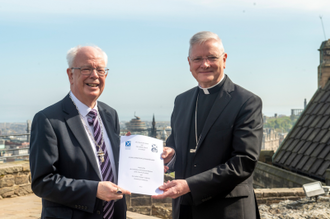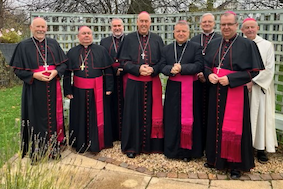Catholic Church and Church of Scotland release Declaration of Friendship

Lord Wallace and Most Reverend Leo Cushley
Source: SCMO/Church of Scotland
The General Assembly of the Church of Scotland will be invited to welcome an historic Declaration of Friendship with the Catholic Church in Scotland that offers 'a decisive and irrevocable statement of our friendship with one another, based on our shared faith in Christ.'
The culmination of more than 100 years of ecumenical relationship building between the two Churches, the Declaration of Friendship will be presented to the General Assembly on Monday 23 May. It has already been approved by the Bishops Conference of the Catholic Church in Scotland.
The declaration speaks of the shared faith and common ground that unites the Churches, saying:
"We recognise each other as brothers and sisters in Christ, and we wish to express our friendship and respect for one another as fellow Christians, citizens and partners in announcing the kingdom of God in our land.
"Since the World Missionary Conference (Edinburgh, 1910), and the Second Vatican Council (1962-1965) much has been done ecumenically to repair what was broken and to restore mutual respect and friendship.
"A great deal has been achieved spiritually, practically and affectively, through joint prayer among our parishes, various joint commissions, and the growing knowledge and appreciation of each other as Christian friends and fellow pilgrims."
Most Reverend Leo Cushley, Archbishop and Metropolitan of St Andrews and Edinburgh, said: "Returning to live in Scotland after many years abroad, I was soon struck by how far the people of the Catholic Church and the Church of Scotland have come along the path of friendship in these last decades. We have now spent forty years working diligently to respect and understand each other, what we have in common, what still divides us. In the meantime, through prayer together and social action, we have also become friends, and have grown to appreciate each other as fellow brothers and sisters in Christ. I believe this is something to acknowledge and to celebrate. My brother bishops and I welcome this declaration, and we hope that it will likewise be welcomed by our Catholic brothers and sisters throughout the country. The strands of a more profound dialogue will continue as before, but there is much to be said for acknowledging all that we hold in common, and for celebrating the friendship of the members of our two churches. I also hope it will lead to a deeper bond with all our fellow Christians in Scotland."
Lord Wallace, Moderator of the General Assembly of the Church of Scotland, said: "During my term as Moderator, I have very much valued the friendly and productive working relationship I have had with Archbishop Cushley, Bishop (now Archbishop) Nolan and other members of the Catholic Church in Scotland, as we have sought to navigate our way through Covid restrictions and address crucial issues facing our country and, indeed our world, such as the cost-of-living burden, and the climate crisis. Our respective churches have also collaborated in Scottish Faiths Action for Refugees.
"And one of the most profound moments I've experienced in recent months was joining worship and standing in solidarity with Father Vasyl and members of Edinburgh's Ukrainian Catholic community, when their homeland has been under such unprovoked attack.
"These are all ways in which we show that what unites us is so important to the lives of our fellow citizens and to being witnesses to the Gospel message in this land of Scotland."
An agreement based on shared faith and common ground
Written by senior figures from both Churches, the declaration describes the Churches' shared beliefs, 'rooted in the Apostles, Christ's first disciples,' and acknowledges a common heritage as Christians in Scotland.
'We recall with gratitude to God the earliest missionaries, our forebears in the faith, who lived and preached the Christian faith to our land,' it says. 'We recall those from that time who led and formed the Church, nurturing a society inspired by Christian values, including St Ninian, St Columba and St Margaret.'
The declaration also recognises the divisions of the past, apologises for the hurt and harm caused and seeks to make amends, asserting 'we repent and ask forgiveness of one other.'
Some divisions between the Churches remain challenging and more work will be needed on reconciliation and healing. Nevertheless, the Churches say that what they hold in common is far greater than what divides them, and they commit to continue working towards greater unity.
'We therefore pledge ourselves to live as sisters and brothers in Christ, in public and in private, in life and in mission; to pray with each other and for each other; to be good neighbours, both to each other and to all people among whom we live, of all faiths and none; and to work together for the common good of the nation, as it is given to us to see it.'
The full text of the declaration is shown below.
A Declaration of Friendship between the Church of Scotland and the Catholic Church in Scotland
We, the undersigned, representing the Church of Scotland and the Catholic Church in Scotland, wish publicly to express our recognition of each other as Christians, and as children of God in Christ (Galatians 3: 25-28). We recognise each other as brothers and sisters in Christ, and we wish to express our friendship and respect for one another as fellow Christians, citizens and partners in announcing the kingdom of God in our land.
Since the World Missionary Conference (Edinburgh, 1910), and the Second Vatican Council (1962-1965) much has been done ecumenically to repair what was broken and to restore mutual respect and friendship.
A great deal has been achieved spiritually, practically and affectively, through joint prayer among our parishes, various joint commissions, and the growing knowledge and appreciation of each other as Christian friends and fellow pilgrims.
A SHARED FAITH
Progress has been made on that which we hold in common.
We believe in one God, the Creator; we believe in Jesus Christ, his only begotten Son, true God and true man, fully divine and fully human, who died in the flesh and rose to save us from sin and death; and we believe in the Holy Spirit. We believe in the Holy Trinity, one God in three persons. We believe that the Church is one, holy, catholic and apostolic; and we acknowledge one baptism for the forgiveness of sins, in the name of the Father and of the Son and of the Holy Spirit.
We believe our faith to be rooted in that of the Apostles, Christ's first disciples, those who knew and followed our Lord in this life. We recognise and treasure the Sacred Scriptures, as God's revelation of His love for all humanity. We recognise and hold in common the great ecumenical councils of the first five Christian centuries.
OUR COMMON HOME
We recognise, as our common heritage, the Gospel first brought to our shores so very long ago. We recall with gratitude to God the earliest missionaries, our forebears in the faith, who lived and preached the Christian faith to our land. We recall those from that time who led and formed the Church, nurturing a society inspired by Christian values, including St Ninian, St Columba and St Margaret.
PAST DIVISIONS
We recognise the hurt and the harm that our forebears did to each other in times past, and we repent and ask forgiveness of one other. We also recognise that, even in more recent times, much could have been said between us more kindly, written more magnanimously, and done more charitably, to promote pardon and healing and friendship among Christians in our land.
CHALLENGES WHICH REMAIN
There remain points at which we have not yet found a meeting place, and it is true that some questions still divide us.
Acknowledging what separates us still, we reaffirm that what we hold in common is often greater than what divides us. While recognising that unity does not mean uniformity, we commit ourselves to continuing our pilgrimage towards greater unity, as we believe that it is the Lord's will that we be one (John 17: 21). We trust that such developing unity in Christ is the Lord's work and the Spirit's doing.
LOOKING TOWARDS THE FUTURE
We therefore pledge ourselves to live as sisters and brothers in Christ, in public and in private, in life and in mission; to pray with each other and for each other; to be good neighbours, both to each other and to all people among whom we live, of all faiths and none; and to work together for the common good of the nation, as it is given to us to see it.
May there be an ever more united Christian voice in the land, informed always by the charity and love of Christ and our call to participate in the mission of God. May we contribute to the good of society, while humbly learning from others and from our own mistakes. May our theological reflections and initiatives together thrive; and may our pilgrimage together in our dear land of Scotland bear much fruit to the good of all, and to the greater glory of God.


















